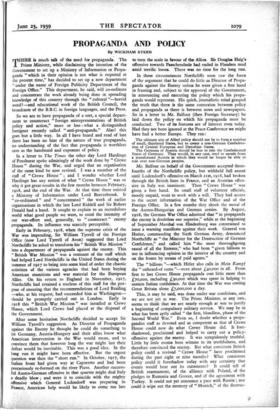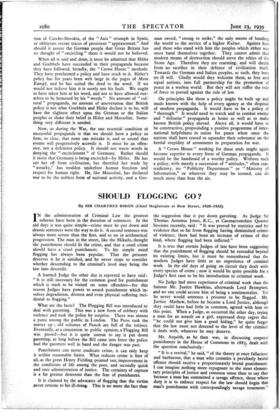PROPAGANDA AND POLICY
By WICKHAM STEED
pHERE is much talk of the need for propaganda. The Prime Minister, while disclaiming the intention of the Government to set up a Ministry of Information or Propa- ganda " which in their opinion is not what is required at the present time," has decided to set up a new department " under the name of Foreign Publicity Department of the Foreign Office." This department, he said, will co-ordinate and concentrate the work already being done in spreading knowledge of this country through the " cultural "—horrid word!—and educational work of the British Council, the broadcasts of the B.B.C. in foreign languages, and the Press.
So we are to have propaganda of a sort, a special depart- ment to counteract " foreign misrepresentations of British policy and action," more or less what a distinguished foreigner recently called " anti-propaganda." Alas ! this goes but a little way. In all I have heard and read of late there has been no hint of the nature of true propaganda, no understanding of the fact that propaganda is worthless save as the handmaid and exponent of policy.
In a letter to The Times the other day Lord Hardinge of Penshurst spoke admiringly of the work done by " Crewe House " during the War, and urged that an organisation of the same kind be now revived. I was a member of the staff of " Crewe House " ; and I wonder whether Lord Hardinge has any notion of what " Crewe House " was or why it got great results in the few months between February, 1918, and the end of the War. At that time there existed a Ministry of Information under Lord Beaverbrook. It " co-ordinated " and " concentrated " the work of earlier organisations in which the late Lord Riddell and Sir Robert Donald had a hand. It sought to explain to an incredulous world what good people we were, to extol the intensity of our war-effort and, generally, to " counteract " enemy propaganda. Its influence was scarcely perceptible.
Early in February, 1918, when the supreme crisis of the War was impending, Sir William Tyrrell of the Foreign Office (now Lord Tyrrell of Avon) suggested that Lord Northcliffe be asked to transform his " British War Mission " into a department of propaganda against the enemy. This " British War Mission " was a remnant of the staff which had helped Lord Northcliffe in the United States during the summer of 1917 to bring into some kind of order the chaotic activities of the various agencies that had been buying American munitions and war material for the European Allies. On his return to England in November, 1917, Northcliffe had retained a nucleus of this staff for the pur- pose of ensuring that the recommendations of Lord Reiding —who, at his request, had succeeded him at Washington— should be promptly carried out in London. Early in 1918 this " British War Mission " was installed at Crewe House, which Lord Crewe had placed at the disposal of the Government.
After some hesitation Northcliffe decided to accept Sir William Tyrrell's suggestion. As Director of Propaganda against the Enemy he thought he could do something to let Germany, Austria-Hungary and their allies know what American intervention in the War would mean, and to convince them that however long the war might last their defeat would be inevitable. This was a good idea. In the long run it might have been effective. But the urgent question was then the " short run." In October, 1917, the Italian front had given way at Caporetto and had been precariously re-formed on the river Piave. Another success- ful Austro-German offensive in that quarter might deal Italy a deadly blow ; and were it to coincide with the mighty offensive which General Ludendorff was preparing in France, American help would be likely to come too late to turn the scale in favour of the Allies. Sir Douglas Haig's offensive towards Passchendaele had ended in Flanders mud amid terrific losses. There was no time for the long run.
In these circumstances Northcliffe soon saw the force of the argument that he could do little as Director of Propa- ganda against the Enemy unless he were given a free hand in framing and, subject to the approval of the Government, in announcing and executing the policy which his propa- ganda would represent. His quick, journalistic mind grasped the truth that there is the same connexion between policy and propaganda as there is between news and newspapers. So in a letter to Mr. Balfour (then Foreign Secretary) he laid down the policy on which his propaganda must be conducted. Two of its features are of interest even today. Had they not been ignored at the Peace Conference we might have had a better Europe. They ran:
The ultimate aim of Allied policy should not be to form a number of small, disjointed States, but to create a non-German Confedera- tion of Central European and Danubian Sates.
The Germans of Austria should be free to join the Confederated States of Germany. They would, in any case, tend to secede from a transformed Austria in which they would no longer be able to rule over non-German peoples.
Mr. Balfour on behalf of the Government accepted three- fourths of the Northcliffe policy, but withheld full assent until Ludendorff's offensive on March 21st, 1918, had broken through the British lines in France, and an Austrian offen- sive in Italy was imminent. Then " Crewe House " was given a free hand. Its small staff of volunteer officials, mostly unpaid, went to work with a will. They had access to the secret information of the War Office and of the Foreign Office. In a few months they shook the moral of the Austro-Hungarian and German armies. By August, 1918, the German War Office admitted that " in propaganda the enemy is doubtless our superior," while at the beginning of September Marshal von Hindenburg was constrained to issue a warning manifesto against their work. General von Hutier, commanding the Sixth German Army, denounced Northcliffe as " the Minister for the Destruction of German Confidence," and called him " the most thoroughgoing rascal of all the Entente," who had been " given billions to use in influencing opinion in the interior of the country and on the fronts by means of paid agents."
The " billions "—which Hitler also calls in Mein Kampf the " unheard-of sums "—were about L40,000 in all. From first to last Crewe House propaganda cost little more than L70,000, including £30,000 which was spent in helping to sustain Italian confidence. At that time the War was costing Great Britain alone £7,000,000 a day.
This, it may be said, was done under war conditions, and we are not yet at war. The Prime Minister, at any rate, seems to think that we are nearly enough at war to justify a beginning of compulsory military service. We may be in what has been aptly called " the first, bloodless, phase of the Second World War." Even so, I doubt whether a propa- gandist staff as devoted and as competent as that of Crewe House could now do what Crewe House did. It fore- shadowed, proclaimed and helped to carry out a policy- offensive against the enemy It was scrupulously truthful. Little by little events bore witness to its truthfulness, and therefore convinced the enemy. But what consistent British policy could a revived " Crewe House " have proclaimed during the past eight or nine months? What consistent policy could it foreshadow today with any certainty that events would bear out its statements? It could tell of British rearmament, of the alliance with Poland, of the pledges to Rumania and Greece, and of the agreement with Turkey. It could not yet announce a pact with Russia ; nor could it wipe out the memory of " Munich," of the destruc- tion of Czecho-Slovakia, of the " Axis " triumph in Spain, or obliterate recent traces of persistent " appeasement." And should it assure the German people that Great Britain has no thought of " encircling " them it would not be believed.
When all is said and done, it must be admitted that Hitler and Goebbels have succeeded in their propaganda because they have followed, broadly, the " Crewe House " methods. They have proclaimed a policy and have stuck to it. Hitler's policy has for years been writ large in the pages of Mein Kamp f, and he has suited the deed to the word. If we would not believe him it is surely not his fault. We ought to have taken him at his word, and not to have allowed our- selves to be bemused by his " words." No amount of " cul- tural " propaganda, no amount of asseveration that British policy is not what Goebbels and Hitler declare it to be, will- have the slightest effect upon the German or the Italian peoples or shake their belief in Hitler and Mussolini. Some- thing very different is needed.
Now, as during the War, the one essential condition of successful propaganda is that we should have a policy so firm, so clear, that none can mistake it, and so sound that events will progressively accredit it. It must be an offen- sive, not a defensive policy. It should not waste words in denying the " encirclement " of Germany. Rather should it insist that Germany is being encircled—by Hitler. He has cut her off from civilisation, has throttled her trade by " autarky," has trodden underfoot human freedom and respect for human right. He, like Mussolini, has declared war to be the noblest form of national activity, and a Ger- man sword, " strong to strike," the only means of bending the world to the service of a higher Kultur. Against him and those who stand with him the peoples which abhor war must band themselves together. They cannot admit that modern means of destruction should serve the ethics of the Stone Age. Therefore they are rearming, and will shrink from no sacrifice in their defence of civilisation itself. Towards the German and Italian peoples, as such, they bear no ill will. Gladly would they welcome them, as free and equal nations, into full partnership for the promotion of peace in a warless world. But they will not suffer the rule of force to prevail against the rule of law.
On principles like these a policy might be built up and made known with the help of every agency at the disposal of modern propaganda. It would have to be a policy of " thorough." It would need to watch and to combat enemy and " defeatist " propaganda at home as well as to make known British policy abroad. Above all, it would have to be constructive, propounding a positive programme of inter- national helpfulness in union for peace when once the nations shall have ceased to squander their substance on the bestial stupidity of armaments in preparation for war.
A " Crewe House " working for these ends might again become superior to every form of German propaganda. It would be the handmaid of a worthy policy. Without such a policy, with merely a succession of " attitudes," often con- tradictory, no " Publicity Department " or " Ministry of Information," or whatever they may be termed, can do much more than beat the air.











































 Previous page
Previous page